Where to Install CCTV Cameras in Your Office
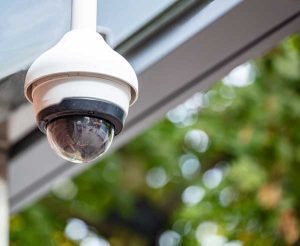
The safety and security of your workers and assets should be a primary concern for every company owner. Installing CCTV cameras in your workplace may give piece of mind and act as a deterrent to possible theft or crime. But with so many alternatives on the market, how can you pick the perfect system for your needs? Read on for our professional recommendations and instructions on how to install CCTV cameras in your workplace.
Installing CCTV Cameras in Your Office: Step by Step Guide
Installing a CCTV camera system can seem overwhelming, but with a little guidance, it can be a relatively simple process. Follow these steps to ensure a smooth and successful installation:
The Entrance and Exit Points
One of the most important places to install CCTV cameras is at the entrance and exit points of your office. This is where most people will enter and exit your office, and having cameras in place will help you monitor who is coming and going. This is especially important if you have a reception area or a waiting room where visitors may be left unattended.
Reception Area and Waiting Room
The reception area and waiting room are two other areas where CCTV cameras should be installed. These areas are usually the first point of contact with visitors, and having cameras in place will help you monitor any suspicious behavior. This will also help you keep an eye on any valuable items that may be left in these areas.
High-Risk Areas
High-risk areas such as storage rooms, server rooms, and cash handling areas are also important places to install CCTV cameras. These areas are usually where valuable items are stored, and having cameras in place will help you monitor any suspicious activity. This will also help you keep an eye on any employees who may be accessing these areas.
Open Work Spaces
Open workspaces such as cubicles and shared offices should also have CCTV cameras installed. These areas are usually where employees spend most of their time, and having cameras in place will help you monitor any suspicious behavior. This will also help you keep an eye on any valuable items that may be left in these areas.
Choosing the Right CCTV Camera
When it comes to choosing the right CCTV camera, there are a few things to consider. First, you need to decide whether you want a wired or wireless camera. Wired cameras are more reliable, but they can be more difficult to install. Wireless cameras, on the other hand, are easier to install, but they may not be as reliable.
You should also consider the resolution of the camera. The higher the resolution, the clearer the image will be. This is important if you need to identify someone in the footage. You should also consider the field of view of the camera. A camera with a wider field of view will be able to capture more of the area you want to monitor.
Expert Tips for Optimizing Your CCTV Camera System
Now that you have your CCTV camera system installed, here are some expert tips for optimizing its performance:
- Regular maintenance: Regular cleaning and maintenance of your cameras may assist guarantee they are operating correctly and collecting quality video.
- Proper lighting: Make sure the locations being observed by the cameras are suitably illuminated. This will guarantee the cameras record clear and useable video.
- Secure storage: Make sure any film acquired by the cameras is kept in a secure area, such as a secure cloud storage system.
- Update software: Keep the software for your cameras updated to guarantee they are performing at their optimum.
Frequently Asked Questions about Installing CCTV Cameras in Your Office
- Can I install the cameras myself?
If you are experienced with electrical skills, you may be able to install the cameras yourself. However, if you are hesitant, it’s advisable to employ an expert to install the cameras for you.
- How do I pick the proper placement for my cameras?
Choose a place that affords an appropriate view of the area you wish to monitor and is conveniently accessible for maintenance. Consider places that are most prone to theft or other security issues, such as access and departure points.
- How can I secure the privacy of my workers when employing CCTV cameras in the office?
Make sure to explicitly clarify the function and location of the cameras to your personnel. Also, consider choosing cameras that include privacy capabilities, such as the ability to blur out sensitive sections of the image. It’s also crucial to make sure that any film acquired by the cameras is retained in a safe area and not released without authorized authorization.
- Can I access the video from my cameras remotely?
Yes, many contemporary CCTV camera systems provide the option to watch video remotely using a smartphone app or online interface.
Benefits of Installing CCTV cameras in an office:
Increased Security and Safety
One of the key advantages of having CCTV cameras in a workplace is the enhanced security and safety of the personnel and the premises. These cameras act as a deterrent to prospective offenders and also give proof in case of a security breach. They monitor the premises 24/7, ensuring that any suspicious behavior is recorded on video. With the aid of these cameras, the security professionals can promptly react to any security problems, assuring the safety of the workers and the premises.
Improved Productivity and Employee Morale
Another advantage of putting CCTV cameras in a business is enhanced productivity and staff morale. The existence of these cameras creates a safe and secure working environment, which in turn boosts the staff morale. When workers feel safe and secure, they are more likely to be productive and motivated. They are less inclined to participate in activities that might impair their productivity and the productivity of others. Moreover, the cameras also serve to monitor the job performance of the staff, ensuring that they are reaching the standards established by the organization.
Enhanced Fraud Detection
Installing CCTV cameras in a workplace may help boost fraud detection. In various circumstances, workers may participate in fraudulent actions, such as embezzlement, theft, or misuse of business resources. With the use of these cameras, it becomes simpler to identify such fraudulent acts, and the evidence obtained may be utilized to take necessary action. Moreover, the cameras may also be utilized to monitor the cash handling operations, guaranteeing that the financial transactions are carried out in a transparent and secure way.
Remote Monitoring
Another advantage of having CCTV cameras in a workplace is remote monitoring. With the assistance of contemporary technology, it is now feasible to remotely monitor the premises using a smartphone or computer. This permits the owners or the security professionals to keep an eye on the property even when they are not physically there. In case of any security breach, they can rapidly react, guaranteeing that the issue is under control.
Cost-Effective
Installing CCTV cameras in a workplace is a cost-effective means of insuring the security and safety of the personnel and the property. With the improvement of technology, the cost of these cameras has gone down dramatically, making it viable for companies of all sizes to install them. Moreover, the cost of installation and maintenance of these cameras is also quite minimal, making it an economical solution for enterprises.
Installing CCTV cameras in an office can have potential risks and drawbacks including:
- Privacy concerns: Employees may feel that their privacy is being violated by the constant surveillance, which can lead to decreased morale and decreased job satisfaction.
- Cost: Installing and maintaining a CCTV system can be expensive, especially if you need to install cameras in multiple locations.
- False sense of security: A CCTV system can give a false sense of security, causing people to be less vigilant and less likely to take other security precautions.
- Technical difficulties: Technical issues, such as equipment failure, software malfunctions, or network disruptions, can limit the effectiveness of a CCTV system.
- Legal issues: There may be legal restrictions on the installation and use of CCTV cameras, particularly regarding data protection and privacy laws.
- Limited use: CCTV cameras may not be effective in deterring or solving all types of crimes, such as those that occur inside a building or in areas that are not within the camera’s field of view.
The Cost of CCTV Cameras
The cost of CCTV cameras can vary greatly depending on the type and features. Basic analogue cameras can start from as low as $400, while high-end digital cameras with advanced features can cost several thousand pounds. The cost of installation and maintenance can also add to the overall cost. Businesses should consider the cost of cameras, installation, and maintenance when determining their budget for a CCTV system.
The Potential Return on Investment for Businesses
The potential return on investment for firms might be enormous. The usage of CCTV cameras may assist minimize the occurrence of crime and increase the safety of staff and consumers. It may also give vital evidence in the case of a crime or dispute. In addition, CCTV cameras may give companies with a visual record of their activities, enabling them to monitor and improve their procedures. The potential return on investment may be enormous, making the expense of CCTV cameras well worth it for many firms.
Different Types of Cameras Available
There are several types of CCTV cameras available, each with its own features and benefits. Here are some of the most common types:
Analogue Cameras
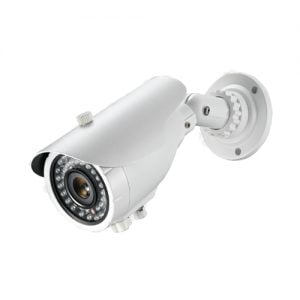
Analogue cameras are the most basic sort of CCTV cameras. They employ coaxial wire to send the video signal to a display or recording device. Analogue cameras are economical and quick to install, making them a popular option for small enterprises.
Digital Cameras
Digital cameras, often known as IP cameras, utilize the internet to send the video signal. This enables for remote viewing and recording, making them a popular alternative for bigger enterprises. Digital cameras also provide greater resolution and more complex functions than analogue cameras.
Dome Cameras
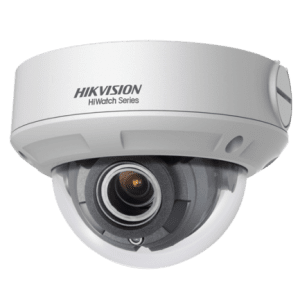
Dome cameras are called for its dome-shaped housing, which makes it difficult for intruders to discern which direction the camera is facing. Dome cameras are a popular option for companies because they give a covert method to monitor their premises.
Bullet Cameras
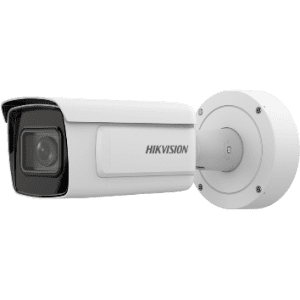
iDS-2CD7A46G0-IZHS
For Effective Protection and Efficient Management
Bullet cameras are long and cylindrical, like a bullet. They are built for outdoor usage and are frequently weather-resistant. Bullet cameras are a popular alternative for organizations that need to monitor their perimeter.
PTZ Cameras
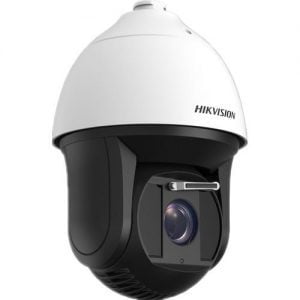
PTZ cameras, or Pan-Tilt-Zoom cameras, enable the operator to control the camera’s position and zoom remotely. PTZ cameras are a popular option for organizations that need to cover broad regions or monitor many points of interest.
Wireless Cameras
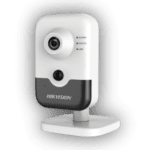
Digital Cameras
Digital cameras, often known as IP cameras, utilize the internet to send the video signal. This enables for remote viewing and recording, making them a popular alternative for bigger enterprises. Digital cameras also provide greater resolution and more complex functions than analogue cameras.
Dome Cameras
Dome cameras are called for its dome-shaped housing, which makes it difficult for intruders to discern which direction the camera is facing. Dome cameras are a popular option for companies because they give a covert method to monitor their premises.
Bullet Cameras
Bullet cameras are long and cylindrical, like a bullet. They are built for outdoor usage and are frequently weather-resistant. Bullet cameras are a popular alternative for organizations that need to monitor their perimeter.
PTZ Cameras
PTZ cameras, or Pan-Tilt-Zoom cameras, enable the operator to control the camera’s position and zoom remotely. PTZ cameras are a popular option for organizations that need to cover broad regions or monitor many points of interest.
Wireless Cameras
Wireless cameras utilize Wi-Fi to transmit the video signal, making them simple to install and excellent for organizations that need to monitor hard-to-reach places. Wireless cameras are also a fantastic solution for organizations that need to extend their CCTV system in the future.
To connect a CCTV camera to a monitor or recording device, you’ll need the following steps:
- Obtain the appropriate cables: Most CCTV cameras will require either a BNC cable or an Ethernet cable to connect to the monitoring device.
- Connect the cable to the camera: Connect one end of the cable to the camera’s video output port.
- Connect the cable to the monitoring device: Connect the other end of the cable to the video input port on the monitor or recording device.
- Power the camera: Most CCTV cameras require a power source, either through an AC adapter or a separate power cable. Make sure the camera is powered on.
- Configure the monitoring device: If using a DVR, you’ll need to configure it to recognize the cameras and set up the display and recording settings. If using a monitor, you may need to change the input source to the video port where the cable is connected.
Note: The specific instructions may vary based on the specific camera, monitor or recording device, and cables being used.
Conclusion
In conclusion, the cost of CCTV cameras may vary widely depending on the kind and functionality, but the potential return on investment for organizations can be enormous. Businesses should consider the cost of cameras, installation, and maintenance when deciding their budget for a CCTV system. The many kinds of cameras available provide varying advantages and features, enabling companies to pick a CCTV system that best meets their individual demands and budget. Whether it’s for security reasons, to enhance company operations, or for peace of mind, CCTV cameras may be a worthwhile investment for organizations of all sizes.
It’s also crucial for companies to pick the correct sort of cameras for their unique purposes. For example, if a company has to monitor a vast area or watch numerous places of interest, a PTZ camera can be a better alternative than a standard analogue camera. On the other hand, if a company needs to extend its CCTV system in the future, a wireless camera could be a better alternative than a wired digital camera.
When picking a CCTV system, companies should also evaluate the quality of the cameras and the installation procedure. Bad quality cameras with limited resolution may make it difficult to distinguish persons and things, while a poor installation might result in broken cameras that are difficult to replace. It’s crucial to find a reliable provider and installer that can supply high-quality cameras and installation services.
Finally, companies should also examine the security of their CCTV system. This involves protecting the cameras and their wires, securing the recording device, and securing access to the video footage. The video material gathered by CCTV cameras may be sensitive and secret, and it’s crucial for organizations to ensure that their CCTV system is safe.